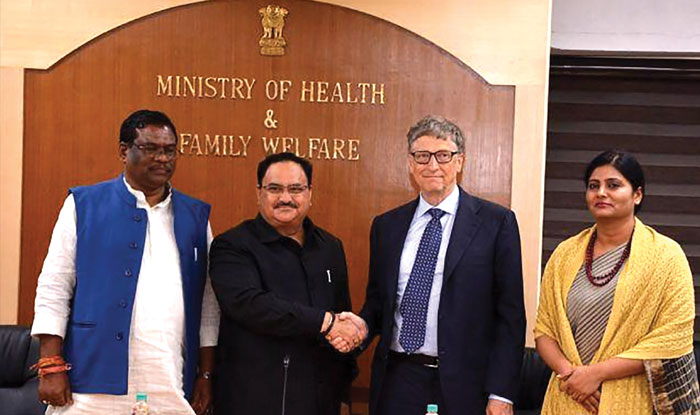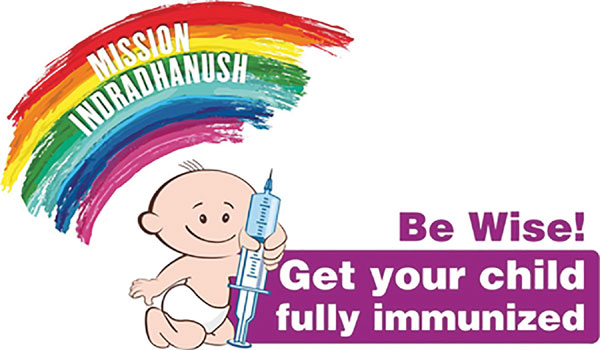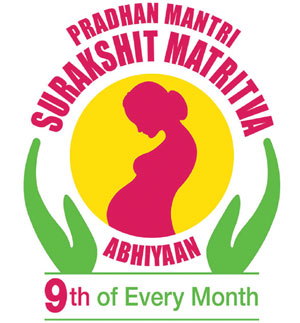
J P Nadda Vision for a Healthy India
The Union Cabinet in March approved the National Health Policy 2017 after having deferred it twice before. The last health policy was issued 15 years ago in 2002.
Health Minister J P Nadda says the policy advocates a progressively incremental assurance-based approach. It envisages providing larger package of assured comprehensive primary health care through the ‘Health and Wellness Centre’s and denotes important change from very selective to comprehensive primary health care package which includes care for major NCDs [non-communicable diseases], mental health, geriatric health care, palliative care and rehabilitative care services.
It aims to allocate major proportion of resources to primary care and intends to ensure availability of two beds per 1,000 populations distributed in a manner to enable access within golden hour [the first hour after traumatic injury, when the victim is most likely to benefit from emergency treatment].
In addition, the policy proposes free drugs, free diagnostics and free emergency and essential health care services in all public hospitals in a bid to provide access and financial protection. It also envisages a three-dimensional integration of AYUSH systems encompassing cross referrals, collocation and integrative practices across systems of medicines. It also boasts of having an effective grievance redressal mechanism.
Affordable Medicines and Reliable Implants for Treatment (AMRIT)
Union Health Minister J P Nadda launched India’s first pharmacy retail store named Affordable Medicines and Reliable Implants for Treatment (AMRIT) at the All India Institute of Medical Sciences
(AIIMS) that will provide drugs for cancer and cardiovascular diseases at a 60 to 90 per cent is count on prevailing market rates. The pharmacy will also provide cardiac implants that will be sold at 50 to 60 per cent discount.
The reason this is a good move is simply because of the size of the addressable market. There are about 2.8 million people who suffer from cancer at any point of time in India. With 700,000 new cancer cases diagnosed every year and half-a-million deaths a year, India has a sizeable population of cancer patients.
Cardiac Stent Price Capping
The Union health ministry, following the recommendations of an expert sub-committee, notified the decision to include coronary stents under the National List of Essential Medicines (NLEM) in July 2016. As per the law, drugs and devices listed in the NLEM must be sold at the price fixed by National Pharmaceutical Pricing Authority (NPPA).
NPPA on February 14, 2017 capped prices of coronary stents, a move that will provide major relief to cardiac patients. A stent is a tiny expandable metal scaffold to open up narrowed or blocked arteries.
According to a notification on NPPA’s website, the ceiling price of bare metal stents has been fixed at Rs. 7,260 per unit and that of drug eluting stents and biodegradable stents has been fixed at Rs. 29,600 per unit. The ceiling price excludes local tax and will come into effect immediately. This price is also applicable to all stocks in the trade channel.
NPPA carried out consultations with stakeholders for fixing the ceiling price of coronary stents and considered all available information and data on prices. “During deliberations, it was found that huge unethical markups are charged at each stage in the supply chain of coronary stents resulting in irrational, restrictive and exorbitant prices in a failed market system driven by information asymmetry between the patient and doctors pushing patients to financial misery,” NPPA said in the notification.
The health care industry had been lobbying hard to block the government’s move to cap stents prices as it would hurt margins.
Janani Suraksha Yojana (JSY)
Janani Suraksha Yojana (JSY) is a safe motherhood intervention under the National Rural Health Mission (NHM). It is being implemented with the objective of reducing maternal and neonatal mortality by promoting institutional delivery among poor pregnant women. The scheme is under implementation in all states and Union Territories (UTs), with a special focus on Low Performing States (LPS).
Janani Suraksha Yojana was launched in April 2005 by modifying the National Maternity Benefit Scheme (NMBS). The NMBS came into effect in August 1995 as one of the components of the National Social Assistance Programme (NSAP). The scheme was transferred from the Ministry of Rural Development to the Department of Health & Family Welfare during the year 2001-02.
The NMBS provides for financial assistance of Rs. 500/- per birth up to two live births to the pregnant women who have attained 19 years of age and belong to the below poverty line (BPL) households. When JSY was launched the financial assistance of Rs. 500/- , which was available uniformly throughout the country to BPL pregnant women under NMBS, was replaced by graded scale of assistance based on the categorization of States as well as whether beneficiary was from rural/urban area. States were classified into Low Performing States and High Performing States on the basis of institutional delivery rate i.e. states having institutional delivery 25% or less were termed as Low Performing States (LPS) and those which have institutional delivery rate more than 25% were classified as High Performing States (HPS).
Mission Indradhanush
Mission Indradhanush was launched by the Ministry of Health and Family Welfare, Government of India on December 25, 2014. Between 2009-2013 immunizations coverage has increased from 61% to 65%, indicating only 1% increase in coverage every year. To accelerate the process of immunization by covering 5% and more children every year, Indradhanush mission has been adopted to achieve target of full coverage by 2020.
Objective
The Mission Indradhanush aims to cover all those children by 2020 who are either unvaccinated, or are partially vaccinated against vaccine preventable diseases. India’s Universal Immunisation Programme (UIP) provides free vaccines against 12
life threatening diseases, to 26 million children annually.
The Universal Immunization Programme provides life-saving vaccines to all children across the country free of cost to protect them against Tuberculosis, Diphtheria, Pertussis, Tetanus, Polio, HepatitisB, Pneumonia and Meningitis due to Haemophilus
Influenzae type b (Hib), Measles, Rubella, Japanese Encephalitis (JE) and Rotavirus diarrhoea. (Rubella, JE and Rotavirus vaccine in select states and districts).
 Implementation
Implementation
Focused and systematic immunization drive will be through a “catch-up” campaign mode where the aim is to cover all the children who have been left out or missed out for immunization. Also the pregnant women are administered the tetanus
vaccine, ORS packets and zinc tablets are distributed for use in the event of severe diarrhoea or dehydration and vitamin A doses are administered to boost child immunity.
Mission Indradhanush Phase I was started as a weeklong special intensified immunization drive from 7th April 2015 in 201 high focus districts for four consecutive months. During this phase, more than 75 lakh children were vaccinated of which 20 lakh children were fully vaccinated and more than 20 lakh pregnant women received tetanus toxoid vaccine.
The Phase II of Mission Indradhanush covered 352 districts in the country of which 279 are medium focus districts and remaining 73 are high focus districts of Phase-I. During Phase II of Mission Indradhanush, four special drives of week long duration were conducted starting from October 2015.
Phases I and II of the special drive had 1.48 crore children and 38 lakh pregnant women additionally immunized. Of these nearly 39 lakh children and more than 20lakh pregnant women have been additionally fully immunized. Across 21.3 lakh sessions held through the country in high and mid-priority districts, more than 3.66 crore antigens have been administered.
Phase III of Mission Indradhanush was launched from 7 April 2016 covering 216 districts. Four intensified immunization rounds were conducted for seven days in each between April and July 2016, in these districts. These 216 districts have been identified on the basis of estimates where full immunization coverage is less than 60 per cent and have high dropout rates. Apart from the standard of children under 2, it also focused on 5-yearolds and on increasing DPT booster coverage, and giving tetanus toxoid injections to pregnant women.
Overall, more than 2.2 crore children and approx 60 lacs pregnant women immunize till 15th May, 2017 and also 64 lacs vitamins doses distributed and 57 lacs ORS packets distributed and 1.9 crore zinc tablets distributed across 497 high-focus districts. Since the launch of Mission Indhradhanush, full immunization coverage has increased by 5 per cent to 7 per cent. Mission Indradhanush has resulted in a 6.7 % annual expansion in the immunization cover.
National Dialys is Programme for the End Stage Renal Disease (ESRD) patients
Union health ministry with technical support from National Health Systems Resource Centre (NHSRC) has finally launched national dialysis programme for the End Stage Renal Disease (ESRD) patients, barely within 40 days after the Union finance minister Arun Jaitley announced the programme in the budget speech of 2016 – 2017.
The programme was launched on April 7 by the Union minister of health and family welfare J P Nadda on the occasion of World Health Day 2017 which aims to provide dialysis care at the district hospitals.
Health ministry, NHSRC jointly formulated the programme along with model tender documents for the dialysis programme and has asked all the states/UTs to roll out the programme under the National Health Mission (NHM) on priority basis and adopt the tender document.
The programme was provided the technical design by the division of healthcare technology which is a WHO collaborating centre for health technology policy based at NHSRC, ministry of health and family welfare (MoH & FW) and government of India. This is yet another addition to the successive technology intensive
programmes designed by the division of healthcare technology at NHSRC for the health ministry to government of India.
Apart from formulating the guidelines and designing the programmes the division of healthcare technology at NHSRC is also speedily providing technical support to state governments in the rollout of technology intensive programmes and mega projects such as establishment of medical device manufacturing zones.
Strengthening of District Hospitals has been a key priority under the National Health Mission (NHM) so that people can receive affordable multi-specialty care close to their place of stay. Providing dialysis services in district hospitals would be an important step in this direction.
Pradhan Mantri Surakshit Matritva Abhiyan (PMSMA) to reduce maternal and infant mortality rates
“Carrying forward the vision of our Prime Minister Narendra Modi, the Pradhan Mantri Surakshit Matritva Abhiyan (PMSMA) is aimed to reduce maternal and infant mortality rates through safe pregnancies and safe deliveries. The national programme will provide special free antenatal care to about 3 crore pregnant women across the country in order to detect and prevent high risk pregnancies.” This was stated by J P Nadda, Union Minister of Health and Family Welfare at the launch of Pradhan Mantri Surakshit Matritva Abhiyan (PMSMA) on November 4, 2016. Nadda stated that the nationwide programme will provide fixed day assured, comprehensive and quality antenatal care to pregnant women on the 9th of every month.

Pregnant women can now avail of a special antenatal check-up in their second or third trimesters at Government health facilities provided by gaenocology specialists/ physicians with support from private sector doctors to supplement the efforts of the Government sector, Shri Nadda stated. These services including ultrasound, blood and urine tests will be provided in addition to the routine antenatal check-ups at the identified health facility/outreach in both rural and urban areas. One of the aims is to identify and follow-up on high risk pregnancies in order to reduce MMR and IMR, he added.
Pointing out that private practitioners will play a critical role in the success of this programme Nadda said that this needs to be made a national social movement which shall engage the doctors from the private sector and other stakeholders. Nadda administered the #IPledgeFor9 Pledge for urging all to support this programme. The Health Minister appealed to the private sector doctors to provide voluntary services to supplement the efforts of the Government. “I call upon all stakeholders to be a part of this national movement and work towards reduction in maternal and infant mortality”, he stated.
Swachh Swasth Sarvatra
‘Swachh Swasth Sarvatra’, an inter ministerial joint initiative between the Ministry of Drinking Water and Sanitation and the Ministry of Health and Family Welfare was launched in the Capital on December 29, 2016. Another joint initiative, ‘Swasth Bacche Swasth Bharat’, between Ministry of Health and Family Welfare and the Ministry of Human Resource Development was also launched on the occasion.
The objective of the ‘Swachh Swasth Sarvatra’ initiative is to build on and leverage achievements of two complementary programmes – Swachh Bharat Mission (SBM) and Kayakalp – of the Ministry of Drinking Water and Sanitation and Ministry of Health and Family Welfare, respectively. Under this initiative, Ministry of Drinking Water and Sanitation has declared over 700 blocks as Open Defecation Free (ODF). Community Health Centre’s (CHCs) in ODF blocks of the country will be allocated Rs 10 lakhs under National Health Mission (NHM) to focus on sanitation and hygiene.
Kayakalp
Under Kayakalp, one Primary Health Centre (PHCs) in each district is awarded for meeting quality standards including sanitation and hygiene. Under Swachh Bharat Mission, the Gram Panchayat in which the PHC which gets awarded under Kayakalp for that district will be noted, and special focus will be given to make it at the earliest.
Mental Healthcare Bill to ensure good mental health
The new Mental Healthcare Bill that decriminalizes attempt to suicide and bans use of electric shock therapy for treating children with mental illness was passed by the Lok Sabha on March 27, 2017. An important factor in the Bill is that it separates attempt to suicide from the Indian Penal Code. In effect, IPC provisions cannot be invoked in case of an attempt to suicide.
An estimated 6-7% of India’s population suffers from some kind of mental illness, while 1-2% have an acute condition. Since the person undertakes the step in extreme mental stress – meaning it is triggered by mental illness — the Bill does not criminalise it.
Salient features of the Mental Healthcare Bill include decriminalising attempt to commit suicide, bans use of electric shock therapy for treating children with mental illness, permits conditional use of shock therapy on adults, after being given anaesthesia, muscle relaxants and emphasises on ensuring no intrusion of rightsand dignity of people with mental illness.
With the Lok Sabha’s assent to the legislation, the Mental Healthcare Bill 2016 secured parliamentary approval as it was earlier passed by the Rajya Sabha in August 2016.
Explaining the power of the Bill in the Lok Sabha, Union health minister JP Nadda said, “I hope all of us here are in good mental health. But should any of us sense deterioration, we can nominate beforehand.”
“The earlier Act focused on regulations but this new Bill is patient-centric and after wide consultations, we have ensured that the patient’s interest is safeguarded,” said Nadda.
The Bill also mentions keeping a check on voluntary admissions, and if admission is required, it will be for a specific period under the supervision of a trained psychiatrist. Various stakeholders, including academia, experts and the political establishment, were consulted while formulating the Bill, which focuses on community based treatment.
Special provisions for women and health are there in the Bill, including not separating women from their children unless absolutely necessary.
HIV/AIDS Bill seeks to criminalise discrimination against HIV community
The Human Immunodeficiency Virus (HIV) and Acquired Immune Deficiency Syndrome (AIDS) (Prevention and Control) Bill, 2017 was passed in Lok Sabha on April 12, 2017 to strengthen public health legislature for the HIV community.
Introduced by Senior Congress leader and former health minister Ghulam Nabi Azad in 2014, the Bill seeks to prevent the spread and control of HIV in the country.
According to the UNAIDS Gap Report, there were close to 2.1 million people living with HIV in India till 2015. While there had been 68, 000 AIDS related deaths in 2015, 86,000 new people had acquired HIV infections. These statistics show how crucial the HIV Bill becomes for those who suffer from this disease and bear the social stigma attached to it.
The Bill had been passed by the Rajya Sabha on March 22 earlier this year. “It will empower the people affected with the disease by giving them legal sanctity,” Health Minister J P Nadda had said in his reply to the debate in Lok Sabha. The bill is significant since India has the third largest HIV epidemic in the world. Nadda said the government has spent Rs 2, 000 crore on Anti Retroviral Therapy drugs for such patients last year.
The Bill makes anti-retroviral therapy a legal right of HIV/AIDS patient and states that “every person in the care and custody of the state shall have right to HIV prevention, testing, treatment and counseling services.” It also asks the central and state governments to provide such treatment along with along with infection management. The Bill also asks the state and central governments to facilitate access for the HIV/AIDS community to welfare schemes.
Biomedical Equipment Management and Maintenance Program (BMMP)
Taking serious note of the observations made by the Prime Minister on equipment in various hospitals that are either unused or there is no maintenance resulting in wastage of resources, Shri J P Nadda, Union Minister for Health and Family Welfare, directed the officials of the Ministry to address this and devise appropriate mechanisms to ensure that medical equipment already purchased are properly maintained beyond their guarantee period.
On the instructions of the Health Minister, a massive exercise to map the inventory of all bio-medical equipment was undertaken, including their functionality status. The mapping was successfully completed in 29 States resulting in 7, 56,750 numbers of equipment in 29,115 health facilities costing approximately Rs 4564 Crores being identified. It was also noted that equipment in range of 13% to 34% was found to be dysfunctional across states. Cost of dysfunctional equipment is Rs. 1015.74 Cr.
The Ministry also prepared comprehensive guidelines along with RFP on Biomedical Equipment Management and Maintenance Program (BMMP), linked with uptime of equipment. Under BMMP, support is being provided to the state governments to outsource medical equipment maintenance comprehensively for all the equipment across all the facilities. Subsequent to inventory mapping, RFPs/tenders were rolled out to award maintenance contract for the respective states.
During the review of this process by Shri J P Nadda, it was informed that eleven States namely Andhra Pradesh, Kerala, Rajasthan, Mizoram, Chandigarh, Maharashtra, Sikkim, Madhya Pradesh, Punjab, Jharkhand and Puducherry have outsourced the maintenance. Three states (Tripura, Nagaland, and Arunachal Pradesh) have completed the tendering process and are in the program implementation stage. Five states namely Uttar Pradesh, West Bengal, Chhattisgarh, Karnataka, Gujarat have released the RFP and are in the process of finalizing the tenders. Other states are yet to issue the RFP.For 12 States where work orders have been issued, the dysfunctional equipment costing Rs 378.11 cr became functional in 4 months of work order. There has been a reduction in dysfunctionality rate of about 25% with downtime of 3-4 months to about 5% with maximum downtime of 7 days.
Free Drugs services initiatives under NHM
Under the National Health Mission (NHM), based on proposals from States/UTs, they are being supported for implementing free diagnostic services initiative. Rs. 649.29 crore has been approved for 24 States/UTs in 2016-17 for implementing NHM Free Diagnostic Service Initiative. This Ministry had developed the guidelines for operationalising the Free Diagnostics Initiative which have been shared with the States in July, 2015.
The Government has been requesting and incentivising the States to provide free essential drugs and diagnostics in public health facilities. The Government is already providing support to States/UTs under NHM for provision of a basket of free services for maternal health, child health, adolescent health, family planning, universal immunisation, and for major diseases such as TB, vector borne diseases such as Malaria, dengue and Kala Azar, leprosy, blindness control etc. Other major initiatives for which states are being supported include:-
1. Janani Shishu Suraksha Karyakram (JSSK) for free and cashless care to pregnant women for childbirth, treatment of antenatal and postnatal complications and sick infants.
2. Rashtriya Bal Swasthya Karyakram (RBSK).
3. Pradhan Mantri Surakshit Matritva Abhiyan (PMSMA) has been recently launched in the year 2016 to provide fixedday assured, comprehensive and quality antenatal care universally to all pregnant women on the 9th of every month free of cost.
4. Support for provisioning of ambulances, Mobile Medical Units and referral transport services is being provided under NHM to strengthen outreach healthcare services in the rural areas and to provide free patient transport services.
5. Free dialysis Services to poor BPL Patients at district level under the Pradhan Mantri National Dialysis Programme of NHM.
Free Diagnostic Services Initiative
Public health being a State subject, the primary responsibility for providing affordable and quality health services to the population lies with the State Governments. Under the National Health Mission (NHM), States are already being supported for implementing free diagnostics initiative. Guidelines for operationalising the Free Diagnostics Initiative have also been shared with the States on 2nd July, 2015.
The Government is already providing support to States/ UTs under NHM for provision of a basket of free services for maternal health, child health, adolescent health, family planning, universal immunisation, and for major diseases such as TB, vector borne diseases such as Malaria, dengue and Kala Azar, leprosy etc. Other major initiatives for which states are being supported include Janani Shishu Suraksha Karyakram (JSSK), Rashtriya Bal Swasthya Karyakram (RBSK), Rashtriya Kishor Swasthya Karyakram (RKSK), National Health Mission Free Drugs and Free Diagnostics Service Initiatives etc. Support is also being provided to the States for roll out of Universal Health Coverage pilots.

























